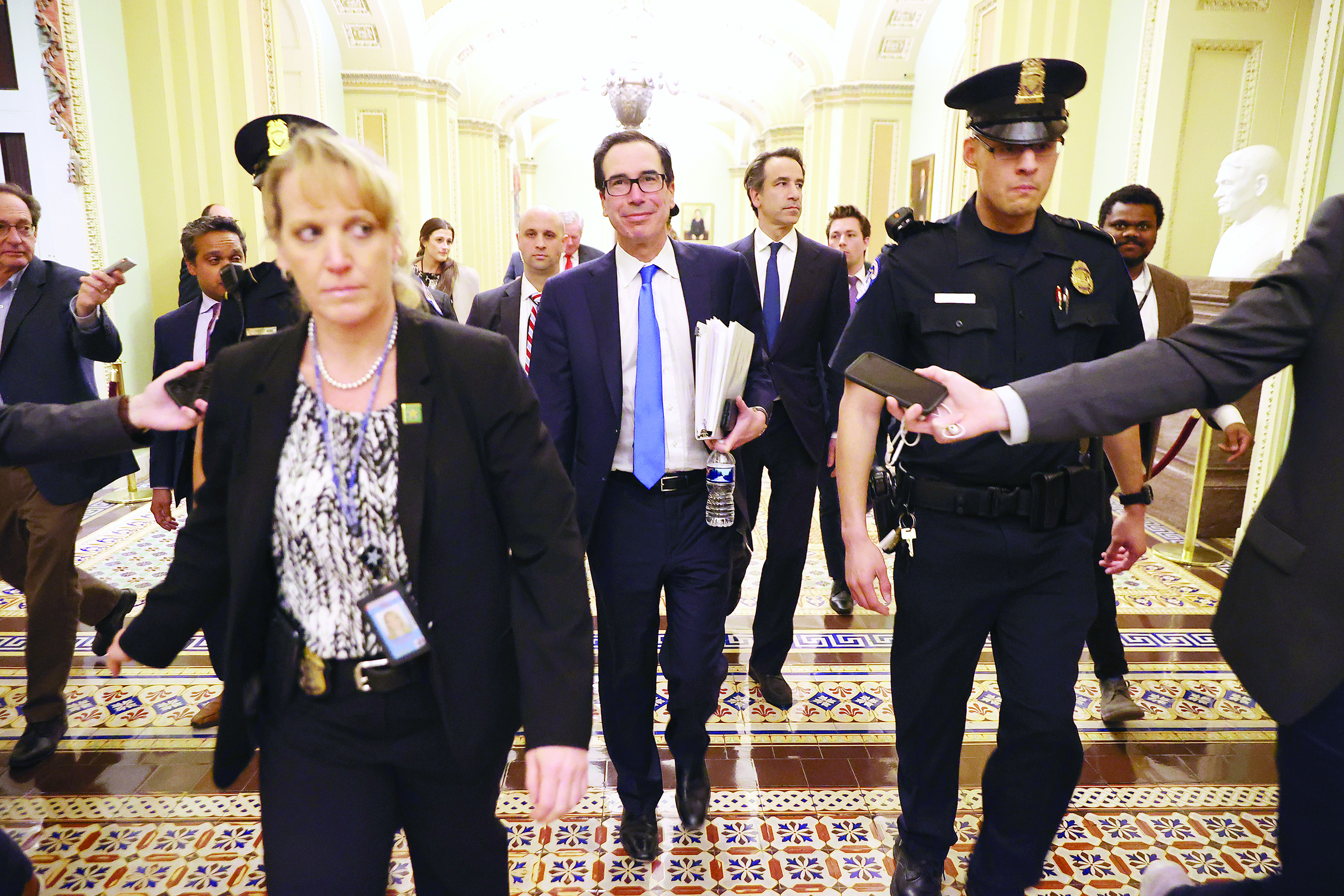
WASHINGTON: The Senate and White House have reached agreement on a $2 trillion stimulus package for the US economy and millions of Americans ravaged by the coronavirus crisis, top lawmakers said early yesterday. "At last, we have a deal," Senate Majority Leader Mitch McConnell said, hailing the massive "wartime level of investment into our nation" reached after five days of arduous and tense negotiations.
"We have a bipartisan agreement on the largest rescue package in American history," top Senate Democrat Chuck Schumer said shortly after McConnell spoke. "So many people are being put out of work through no fault of their own. They don't know what their future is going to be like, how are they going to pay the bills," Schumer added. "Well, we come to their rescue."
The Senate and House of Representatives still need to pass the legislation before sending it to President Donald Trump for his signature. McConnell said the Senate will vote on the measure later. The deal aims to buttress the teetering economy by giving roughly $2 trillion to health facilities, businesses and ordinary Americans buckling under the strain of the coronavirus pandemic. The measure will put cash directly into the hands of Americans hard hit by the crisis, provides grants to small businesses and hundreds of billions of dollars in loans for larger corporations including airlines, and expands unemployment benefits.
It will also inject some $130 billion into what Schumer calls "a Marshall Plan for hospitals" and health care infrastructure, referring to the huge American aid program to rebuild Europe after World War II. With viral outbreaks spreading coast to coast, hospitals have been in dire need of equipment like protective gear, intensive care beds and ventilators.
US stocks had already surged Tuesday on expectations of an agreement. The agreement followed multiple failed attempts to advance a Republican-led proposal, and pressure had soared to swiftly reach a compromise that provides relief for hundreds of millions of Americans. President Donald Trump called for an immediate resolution to the stalemate.
'Stop negotiating'
Democrats rejected the original package, arguing it put corporations ahead of workers, including health professionals on the front lines of the battle against a pandemic that has infected 55,000 and killed nearly 800 in the US alone.
As the hours ticked away Tuesday, several lawmakers voiced their anxiety.
"Pass the damn bill. Stop negotiating. Enough is enough," a visibly angry Republican Senator Lindsey Graham said on the floor, after accusing Democrats of "nickeling and diming at a time people are dying." Any relief package that passes the Senate will need to clear the Democratic-led House too before going to Trump. Speaker Nancy Pelosi unveiled a more generous, roughly $2.5 trillion counterproposal that included ambitious elements like guaranteed paid and family medical leave, student loan forgiveness and oversight of the $500 billion earmarked for corporations.
But she signalled the House may simply take up the Senate bill and try to pass it. "Much of what we have in our bill is reflected in this supposed agreement," Pelosi said. According to Schumer, the compromise legislation includes an oversight mechanism for the company loans, and expanded unemployment provisions for workers laid off or sickened during the pandemic. "Every American worker who is laid off will have their salary remunerated by the federal government, Schumer said. Pelosi suggested the measure might even pass the House by unanimous consent. But getting 435 lawmakers to swallow a gargantuan rescue package without debate could be an uphill proposition in a sharply divided chamber.
Asian shares gained yesterday in the wake of Wall Street's massive rebound as US senators and Trump administration officials reached an agreement on a giant economic stimulus bill to alleviate the economic impact of the coronavirus outbreak. European benchmark stock futures rose more than 1 percent in early trade but US stock futures were down 1 percent as the news about the deal invited profit-taking after big gains the previous day.
"No doubt it's a positive development that they've agreed… But once it is approved the question is how it is implemented," said Jason Teh, chief investment officer at Vertium Asset Management in Sydney. "It's good the authorities are going to throw everything at it. But if the virus is not controlled in the US, then they're going to have to throw another trillion dollars."
MSCI's broadest index of Asia-Pacific shares outside Japan gained 3.4 percent while Japan's Nikkei surged 6.9 percent. "Japanese shares have been bolstered by aggressive buying from the Bank of Japan and pension money this week. That has prompted hedge funds to cover their short positions," said Norihiro Fujito, chief investment strategist at Mitsubishi UFJ Morgan Stanley Securities.
MSCI's gauge of stocks across the globe was up 1.0 percent, having rallied 8.39 percent on Tuesday, the largest single-day gain since the wild swings seen during the height of the global financial crisis in October 2008. On Wall Street, the Dow Jones Industrial Average soared 11.37 percent on Tuesday, its biggest one-day percentage gain since 1933. Yet, much of the large gains in stock markets pale in comparison with the brutal selloff of the past few weeks as investors braced for a deep global recession due to the pandemic and sweeping lockdowns in many countries.
The US S&P500 is still down almost 28 percent from its record peak hit just over a month ago. "Many analysts have recently put out dire economic forecasts, like annualized rate of 20 percent fall in US GDP next quarter. Europe and Japan should also see double-digit contractions," said Nobuhiko Kuramochi, chief strategist at Mizuho Securities. "I suspect the outlooks have sunk in among market players already and that the bear market has run about 80 percent of its course for now." - Agencies











